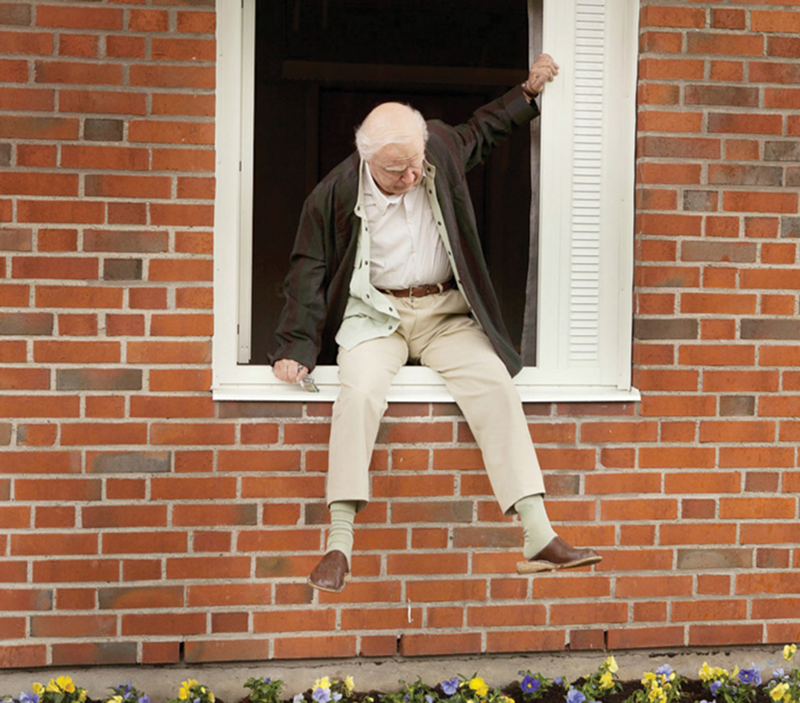I have to admit that sometimes, as a working critic, I love to read the buzz on films to get a sense of the general consensus. It doesn’t matter whether the project is a major studio release — a summer tentpole or a notable awards-season entry — or an indie with box-office sleeper potential. I think part of the allure involves finding a film that allows me to stand apart from the herd, usually because I’ve seen something in the material that escaped the notice of the critical trendsetters.
In the case of the new Swedish release The 100-Year-Old Man Who Climbed Out the Window and Disappeared, from director Felix Herngren (co-adapting Jonas Jonasson’s novel with Hans Ingemansson), which is the third-highest grossing film in the country behind a couple of the Millennium Trilogy movies, it appears to be willing to bank amiable comparisons to Forrest Gump. There is an obviousness to parallels that insults intelligence on certain levels.
Barely educated from a young age, Allan Karlsson (Robert Gustafsson) proves to be a savant with explosives. Blowing things up, he might say, gives his life purpose, and he’s great at it. Unfortunately, his talent results in his placement in a reform school (when he inadvertently injures a passerby). He lives by a rather simple philosophy, one of the few things passed down to him from his mother: Don’t think. His father, a radical revolutionary, thought way too much and it got him killed by a firing squad. Instead, Karlsson comes to the notion that with life, “it is what it is, and it will be what it will be.”
And so, Karlsson wanders obliviously through a long series of escapades that bring him into the orbit of a host of historic luminaries. After bombing bridges during the Spanish Civil War, he ends up dining and dancing with General Franco. He drifts to America and joins the Manhattan Project, where he provides a key nugget of inspiration to Robert Oppenheimer that allows for the creation of the atomic bomb. He drinks tequila with Vice President Harry Truman, dances (again with the dancing, although he’s quick to point out that men shouldn’t dance so much) with Stalin, spends time in a gulag with the idiot brother of Einstein before eventually serving as the trigger man in the long, cold series of exchanges between Reagan and Gorbachev prior to the destruction of the Berlin Wall.
Of course, this picaresque journey through the pages of history unfolds opposite a more contemporary tale that, while far less concerned with Karlsson’s brushes with infamous types and significant moments, captures the shrugging devil-may-care spirit that guides his every move. Yet another explosive encounter leads to Karlsson’s placement in a retirement home, on the eve of his 100th birthday. As the staff prepares a fitting celebration, the old fella climbs out of his window and embarks on a twisted series of misadventures involving a piece of luggage stuffed with 50 million Euros and a gaggle of would-be murderous nitwits eager to reclaim the money at any and all cost.
Rather than blowing things up, as he has proven quite capable of doing, Karlsson winds up enlisting the aid of a ragtag collection of fellow free spirits like Julius (Iwar Wiklander), another whip-smart senior hungry for a little action, and Benny (David Wiberg), the perpetual student who becomes the reluctant driver for the dynamic duo on the lam.
In Hollywood’s broad embrace, The 100-Year-Old Man would turn into Last Vegas, the 2013 aging-buddy comedy starring Robert De Niro, Michael Douglas, Morgan Freeman and Kevin Kline. In fact, Morgan Freeman’s character actually climbs out of his bedroom window (it’s on the ground floor) as part of his initial getaway, much like Karlsson. But, truth be told, the best aspect of Herngren’s movie is not the Gumpian romp through the annals of history; rather, it is the slightly twisted caper details involving the criminals and the cops chasing Karlsson and his merry old band.
I couldn’t help drawing favorable comparisons to Magnus Martens’ Jackpot, another Swedish adaptation (this time from a Jo Nesbø story) about a group of guys, a lot of cash and an escalating body count. Martens enjoys the post-Tarantino/Guy Ritchie vibe more than he should, but somehow these kinds of crime capers have a delicious and decadent flavor that we can’t seem to match here in the U.S. The 100-Year-Old Man Who Climbed Out the Window and Disappeared doesn’t want to ape that sordid and bloody dreamscape too much, but it thoroughly acknowledges more of a passing similarity that should not be ignored — mainly because old Karlsson knows that’s where the fun of life sometimes resides. (Opens Friday at Mariemont Theatre) (R) Grade: B






